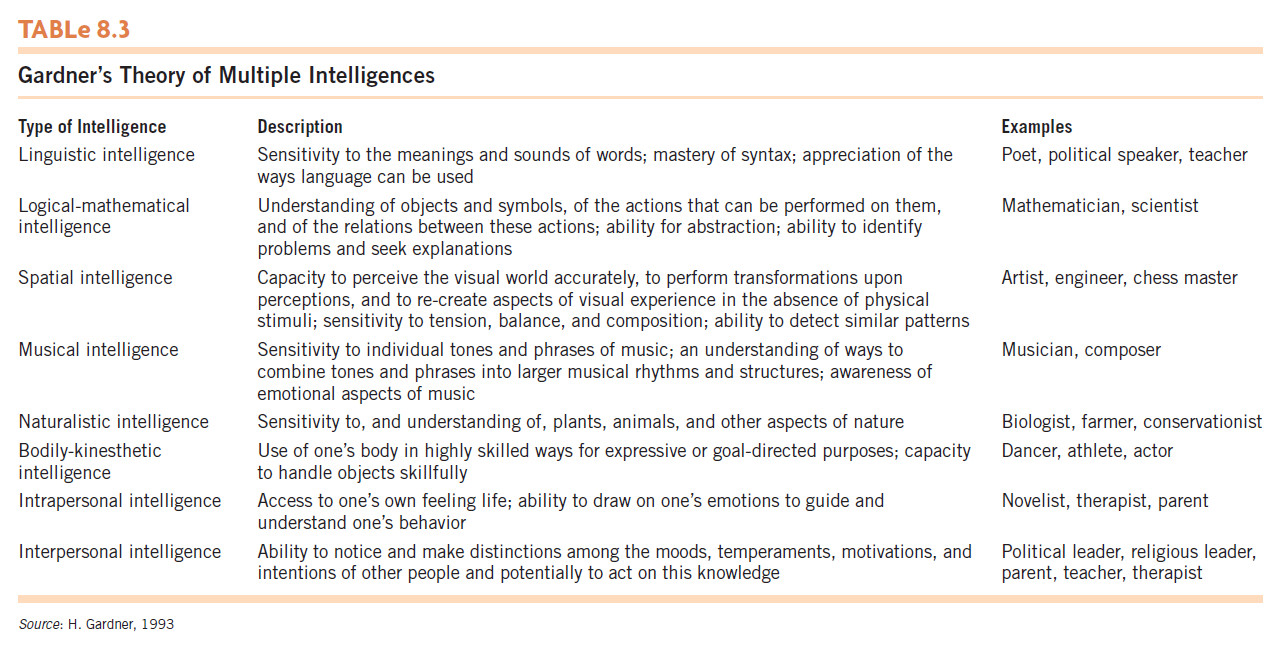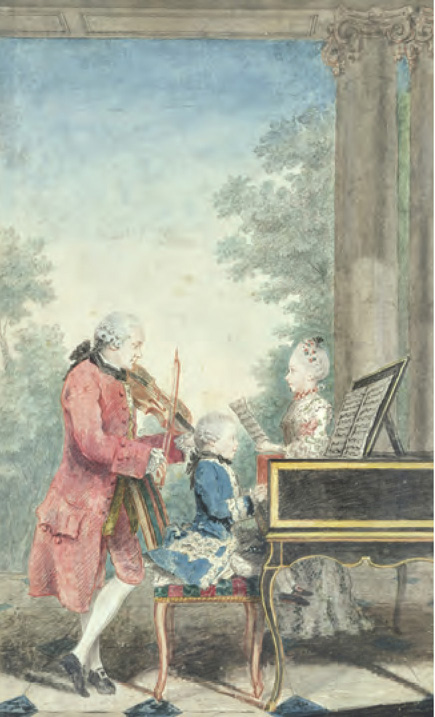Alternative Perspectives on Intelligence
The discussions of intellectual development in this chapter have relied on IQ tests as their main measure. Research using these tests has revealed a great deal about the development of intelligence. However, a number of contemporary theorists have noted that many important aspects of intelligence are not measured by IQ tests. The tests assess verbal, mathematical, and spatial capabilities, but they do not directly examine other abilities that seem to be inherent parts of intelligence: creativity, social understanding, knowledge of one’s own strengths and weaknesses, and so on. This perspective has led Howard Gardner and Robert Sternberg to formulate theories of intelligence that encompass a wider range of human abilities than do traditional theories.
multiple intelligences theory  Gardner’s theory of intellect, based on the view that people possess at least eight types of intelligence
Gardner’s theory of intellect, based on the view that people possess at least eight types of intelligence
Howard Gardner (1993) labeled his approach multiple intelligences theory. Its basic claim is that people possess eight kinds of intelligence: the linguistic, logical-mathematical, and spatial abilities emphasized in previous theories and measured on IQ tests, and also musical, naturalistic, bodily-kinesthetic, intrapersonal, and interpersonal abilities (see Table 8.3).

321

Gardner used several types of evidence to arrive at this set of intelligences. One involved deficits shown by people with brain damage. For example, some brain-damaged patients function well in most respects but have no understanding of other people (Damasio, 1999). This phenomenon suggested to Gardner that interpersonal intelligence was distinct from other types of intelligence. A second type of evidence that Gardner used to identify this set of intelligences was the existence of prodigies, people who from early in life show exceptional ability in one area but not in others. One such example is Wolfgang Amadeus Mozart, who displayed musical genius while still a child but was unexceptional in many other ways. The existence of highly specialized musical talents such as Mozart’s provides evidence for viewing musical ability as a separate intelligence. Although Gardner’s theory of multiple intelligences is backed by less supporting evidence than traditional theories of intelligence, its optimistic message—that children have a variety of strengths on which parents and teachers can build—has led to its having a large influence on education.
theory of successful intelligence  Sternberg’s theory of intellect, based on the view that intelligence is the ability to achieve success in life
Sternberg’s theory of intellect, based on the view that intelligence is the ability to achieve success in life
Robert Sternberg (1999) also argued that the emphasis of IQ tests on the type of intelligence needed to succeed in school is too narrow. However, the alternative view of intelligence that he proposed differs from that proposed by Gardner. Sternberg’s theory of successful intelligence envisions intelligence as “the ability to achieve success in life, given one’s personal standards, within one’s sociocultural context” (p. 4). In his view, success in life reflects people’s ability to build on their strengths, to compensate for their weaknesses, and to select environments in which they can succeed. When people choose a job, for instance, their understanding of the conditions that will motivate them may be crucial to their success.
Sternberg proposed that success in life depends on three types of abilities: analytic, practical, and creative. Analytic abilities involve the linguistic, mathematical, and spatial skills that are measured by traditional intelligence tests. Practical abilities involve reasoning about everyday problems, such as how to resolve conflicts with other people. Creative abilities involve intellectual flexibility and innovation that allow adaptation to novel circumstances.
322
The theories proposed by Gardner and Sternberg have inspired a rethinking of long-held assumptions about intelligence. Intelligence and success in life clearly involve a broader range of capabilities than traditional intelligence tests measure, and measuring these broader capabilities may allow a more encompassing assessment of intelligence. There is not now, nor will there ever be, a single correct theory of intelligence, nor a single best measure of it. What is possible is a variety of theories, and tests based on them, that together reveal the varied ways in which people can be intelligent.
review:
Howard Gardner and Robert Sternberg have formulated novel theories of intelligence. Gardner’s multiple intelligences theory proposes that there are eight intelligences: linguistic, logical-mathematical, spatial, musical, naturalistic, bodily-kinesthetic, intrapersonal, and interpersonal. Sternberg’s theory of successful intelligence proposes that success in life depends on three types of abilities: analytic, practical, and creative. Both theories conceive of intelligence as a broader set of abilities than those included in traditional theories.